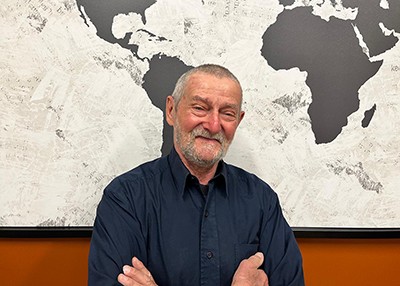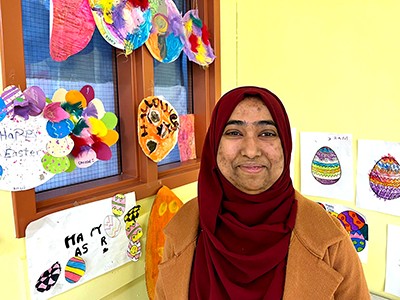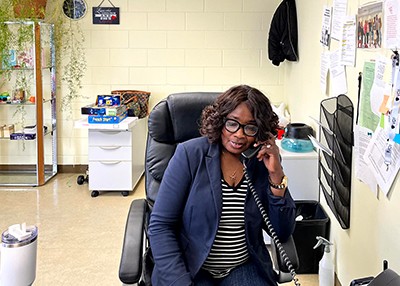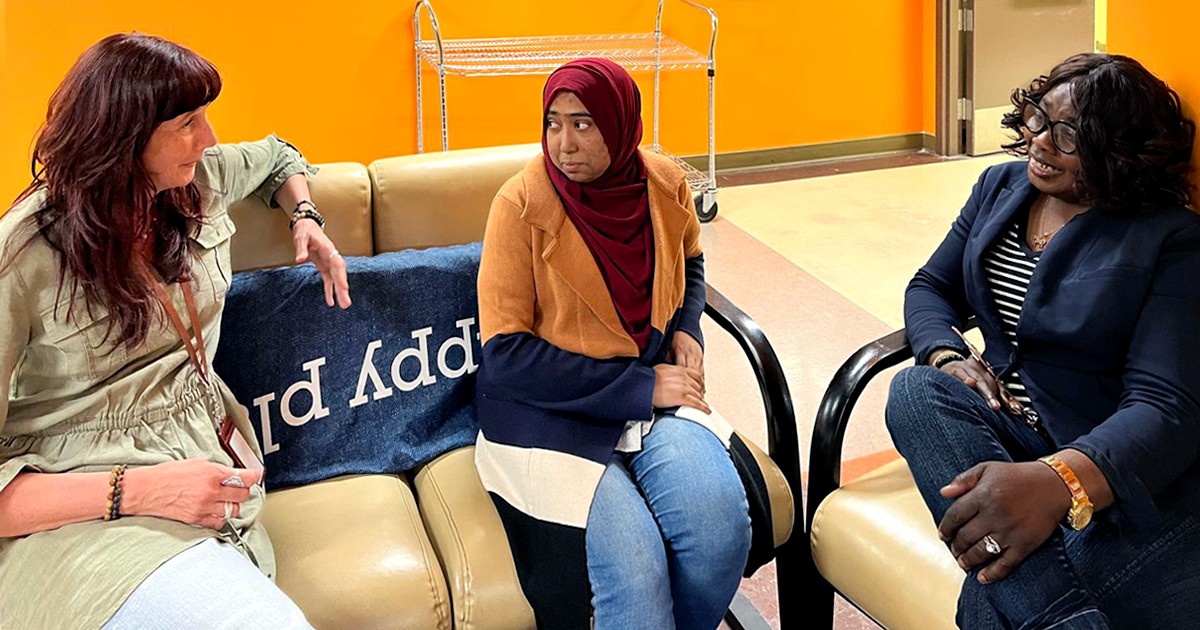Every person who walks through the doors of The Salvation Army seeking assistance has a story to share. And so does every person who is there to greet them, to listen and offer support, and to help them find hope again.
This is true of the staff at the Winnipeg Centre of Hope (WCOH), which hosts programs that include an emergency shelter, transitional housing and the SonRise family shelter.
“We don’t know what somebody is going through when they come to us,” says Zainab Kamara, evening shift co-ordinator at the WCOH, who feels rewarded every time someone returns to her to say thank you or that she made a difference in their lives. “They say to me, ‘I’m tired of telling my story to everyone, but you know me. I feel comfortable with you.’ ”
The staff and volunteers at the WCOH each have their own passions and life experiences that drive their commitment to serving. Like Kamara, they are proud to be a part of something greater than themselves.
Kaz Sawicz: “It’s Not About Me”

Every morning, Kaz Sawicz sets out on a mission of goodwill across the city of Winnipeg. One of his first stops is at the WCOH kitchen, where he arrives with boxes of baked goods, such as bread, cookies and bagels. But Sawicz is more than just a donor; he’s become a part of the family.
“Kaz’s dedication and generosity are truly unparalleled,” says chef Dan Krupka, who manages the cafeteria at the WCOH. “He brings a ray of hope into our kitchen every time he walks through the door, and we are incredibly grateful for his unwavering support.”
Sawicz’s journey began about 14 years ago when he volunteered at a community centre providing free meals to seniors in need. He would assist by collecting donations from the local supermarkets. “I couldn’t bear to see good food go to waste when there were people in our community struggling to make ends meet,” says Sawicz. “It’s not about me; it’s about coming together as a community to uplift one another.”
At first, the supermarkets would only donate bread, but after approaching store managers with a proposition, Sawicz convinced them to redirect more of their surplus to those in need. The list of items quickly grew to include deli meats, sandwiches, dairy, milk and cheese. Later, Sawicz connected with farmers willing to donate surplus vegetables. Before he knew it, he was at the centre of a network of donors providing food and comfort to thousands of people in need across Winnipeg. He now makes daily donations to organizations that include the WCOH, Light House Mission, Main Street Project and several other charities across Winnipeg.
Growing up in Winnipeg’s North End, Sawicz learned the value of community and compassion from his parents. “My parents didn’t have much, but they were always willing to lend a hand to a neighbour in need,” he says. “We learned never to throw anything away; either we could fix it or there was a second life for it somewhere. We’d outgrow our clothes and pass them down to somebody who could use them. Then we’d get shoes from someone who had outgrown theirs.”
Continuing this tradition into adulthood, Sawicz and his wife, Arlene, have remained steadfast in supporting the community, restoring dignity and spreading hope.“
Kaz’s consistent support and genuine care for those in need make him an invaluable part of our community,” says Mark Stewart, WCOH executive director. “His actions speak volumes about the kind of person he is—compassionate, humble and always ready to lend a hand.”
Noshin Tabassum-Urmi: “Empathy Is Important”

In 2021, Noshin Tabassum-Urmi began working part time for The Salvation Army while pursuing a master’s degree in social work at the University of Manitoba. As an international student, she was unable to work full time, but a friend who worked at the WCOH recommended her for a position.
“I was grateful for the opportunity. This was my first job in Canada, and I have continued to work here since then. When I completed my studies, I became a full-time caseworker,” says Tabassum-Urmi.
Tabassum-Urmi’s reason for pursuing a career in social work is simple: “I want to help people who are going through tough times,” she says. “Empathy is important—keeping an open mind and treating people with respect and dignity is crucial to building a successful relationship.”
Working with diverse populations has always been Tabassum-Urmi’s passion, and she has a particular interest in advocating for immigrant and refugee mothers and their children. At the WCOH, Tabassum-Urmi’s primary responsibility is to provide support to families by connecting them with community services and assistance. “Every day can be different from the last,” she says. “My ultimate goal is to help families find housing and live healthy lives with their children.”
According to Tabassum-Urmi, newcomer families have their own set of struggles, such as language barriers and cultural differences, and the WCOH is equipped to address these issues with care and compassion. When Tabassum-Urmi sees their successes, such as children from the shelter beginning their education at a Canadian school or participating in recreational activities in the community, it reaffirms her passion for social work.
“I strongly believe that every child deserves a happy and fulfilling childhood, regardless of their economic or social background,” she says. “It brings me immense joy to witness newcomer families getting a fresh start in life in a community where they do not have to fear for their safety or security.”
Zainab Kamara: “Love What You Do”

Zainab Kamara was hired as a casual worker for The Salvation Army in 2014 and over the past 10 years has dedicated her career to serving people at the WCOH. Now, she works as the coordinator at the SonRise family shelter where she oversees staff and helps with advocacy and referrals.
“The guests that come in are facing a lot of barriers,” says Kamara. “After we do the intake, based on their stories, I do an assessment to determine what their needs are. And then I will try to help them the best possible way that we can, whether it is helping them find housing or advocating on their behalf.”
Kamara studied counselling and international studies at university, with plans to help with development work in African countries. “But then I saw that even in Canada, the country that helped me succeed, there were people that needed help,” Kamara explains. “So I thought, Let me start helping people in my own backyard first.”
Some of Kamara’s friends with whom she attended university are now working in lucrative jobs. “They ask me why I am still working at The Salvation Army,” says Kamara. “For me, it is not about pay, but it is about the people that I serve. I love when I see somebody succeed in life. I want to see those success stories.”
In her time at The Salvation Army, Kamara has worked with countless individuals, many refugees or new to Canada, and it is a rewarding experience when they come back to her and thank her for helping them. “I’m very passionate about helping people. That’s just my personality. Even people I don’t know, or those that are not our clients anymore. They still want to connect, and I welcome them in,” she says.
As a motto, Kamara always says to “love what you do, and do what you love,” and she loves her job at The Salvation Army. “We don’t know what somebody is going through. Some come from abusive homes or from painful backgrounds. I always tell them, ‘If you want to cry or if you’re in pain, my office is there. I don’t care. Come in and cry,’ " says Kamara. “Sometimes we don’t need to talk. You just need to sit there and just cry. I’m happy to receive you.”
Photos: Athaliah Baker










As a former Volunteer there, I loved how I was able to help those in need, I sometimes helped in the chapel but not often, I was more there working with Major Merv and Debbie doing Street Ministry, going to as many encampments as we could manage and that we knew where they were. I miss doing that as I am in Newfoundland now. But the CoH will always have a special place in my heart.